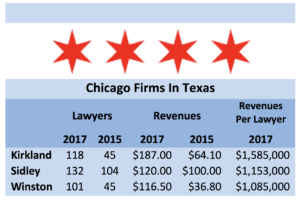© 2018 The Texas Lawbook.
By Mark Curriden
(May 2) – For the better part of the last century, three law firms – Kirkland & Ellis, Sidley Austin and Winston & Strawn – waged a bitter war to dominate the Chicago corporate legal community.
Those same firms raced against each other to gain footholds in New York, London and Washington, D.C. in the 1980s through 2010.
For the past few years, Kirkland, Sidley and Winston faced-off on a new battleground: Texas.
 The three Chicago law firms have spent a lake full of money to aggressively recruit and hire some of the best lawyers in Dallas and Houston away from legacy Texas law firms.
The three Chicago law firms have spent a lake full of money to aggressively recruit and hire some of the best lawyers in Dallas and Houston away from legacy Texas law firms.
War chests were opened. Firm leaders were given nearly unlimited budgets. Multimillion-dollar, multi-year guarantees were offered and big name lawyers jumped.
The big investment in Texas seems to be paying off. Kirkland, Winston and Sidley are three of the fastest growing and most profitable law firms operating in the state.
Kirkland and Sidley now top the rankings of firm’s representing Texas companies involved in mergers and acquisitions. Winston has become a market leader in complex commercial litigation. The firms have top-of-the-market talent for private equity and corporate internal investigations.
Prior to March 2011, Kirkland and Winston had no offices in Texas at all and Sidley had a small outpost in Dallas. Seven years later, the trio has more than 350 lawyers in the Lone Star State and generated an estimated $423 million in combined revenues – more than double what it was just two years ago.
And all three say they are just getting started.
“It is a definite understatement to say that there’s an intense competition between these three firms,” said Kent Zimmerman, a Chicago-based legal industry consultant at Zeughauser Group. “Now, they are duking it out in Texas.
“The huge investment that the three firms have made in Texas is quite impressive,” Zimmerman said.
Even Texas lawyers recently hired by the three firms recognize the century-old battle between the three Chicago firms.

“There are these three outstanding law firms and they had to grow else where and Texas is a logical place,” Melsheimer said. “These are three firms that are each motivated to be better. They have something to prove.”
Here is the story of these three firms in Texas.
1996: Sidley opened an office in Dallas. That same year, Winston litigation chief Dan Webb represented Phillip Morris in the State of Texas’ Medicaid lawsuit against the tobacco companies.
2010: BP hired Kirkland to represent the oil giant in landmark litigation involving the Deepwater Horizon explosion. The Texas firms were conflicted out of advising BP.
2011: Winston opened an office in Houston with lawyers from Howry.
2012: Sidley opened a Houston office by hiring a group of energy transactional partners from different law firms, including Vinson & Elkins and Akin Gump.
2012: Energy Future Holdings, the largest power company in Texas at the time, hired Kirkland to be its lead legal advisor in helping it through bankruptcy and a major corporate restructuring.
2013: Eight equity partners from Weil, Gotshal & Manges jumped to Sidley in Dallas, including: Yvette Ostolaza, Angela Zambrano, Scott Parel, Angela Fontana and Gil Friedlander.
2013: Several partners from Weil’s Houston office, including bankruptcy litigation practice co-chair Melanie Gray, restructuring partner Lydia Protopapas and litigation partner John Strasburger, joined Winston in Houston.
2014: Kirkland opened its Houston office by hiring Simpson Thacher corporate M&A partner Andy Calder to lead its Texas operation.
2017: Winston launched a Dallas office by hiring Melsheimer, Billie Ellis, Matt Orwig and 20 other lawyers from a handful of law firms.
The numbers show just how impressive the three firms have invested in Texas.
Sidley
Sidley has quadrupled its headcount and revenues since 2012. The firm’s revenues from its Texas operations hit $120 million in 2017.

Sidley’s expansion in Houston with the addition of several corporate transactional lawyers over the past few years certainly paid off.
Sidley jumped from 14th in 2016 on The Texas Lawbook’s Corporate Deal Tracker M&A database to second in 2017. The firm’s Texas lawyers worked on 89 corporate transactions last year valued at a combined $26.7 billion.

“We feel that we have built an extraordinary, top-of-the-market team that can handle even the most complex and largest transactions,” Vrielink said. “We are still actively looking to grow, but we will only grow where we think it makes sense for us, the lawyers and our clients.
“We think the firm is well positioned to compete with both other national law firms and Texas-based firms,” he said.
Kirkland
No law firm went from zero to 100 as fast as Kirkland in Houston.

Texas Lawbook research of firm revenues shows that Kirkland’s Houston lawyers went from $64 million in revenues in 2015, its first full year operating in Texas, to $141 million in 2016 and then $187 million in 2017 – a 191.6 percent increase over the three years.
Kirkland has grown from 45 Texas lawyers in 2015 to 118 last year – a 162 percent jump. The firm reportedly has 140 lawyers now and is expected to add 27 first-year associates this fall.
With revenues per lawyer approaching $1.6 million, The Texas Lawbook projects that Kirkland’s revenues from its Texas-based lawyers alone could reach $265 million in 2019, which would make it the fourth largest law firm operating in Texas by revenues.
Calder, in an interview earlier this year with Texas Lawbook M&A writer Claire Poole, said Kirkland will continue to “opportunistically” hire the best talent during the year ahead.
“There’s no upper limit on how big we can get or requirement that we have to get to a certain size,” Calder said. “We have all the departments we want – M&A, capital markets, debt finance, environmental, litigation and tax. We want to continue to expand the scale and improve the quality.”
“We have more incoming calls than outgoing,” he said. “If we see someone who is a great addition to our team, we’re not going to turn them away.”
Kirkland benefited from two key factors in Texas. Kirkland’s firm-wide expertise in bankruptcy and corporate restructurings helped the firm land scores of oil and gas clients in 2015 and 2016 who faced tough economic times during the downturn in commodity prices.
And, as lead legal advisor for EFH in its extraordinarily complex and expensive bankruptcy and restructuring, Kirkland is expected to pocket about $200 million for its five years of work on the matter.
EFH General Counsel Andy Wright said he hired Kirkland to handle the M&A work that was part of the restructuring only because the firm hired Calder. The M&A work for EFH ended up being very lucrative because the company had multiple efforts at trying to sell its 80 percent ownership stake in Oncor Electric Delivery and spun-off TXU Energy and Luminant into a new separate company called Vistra Energy.
Kirkland’s success is easily measured in the Mergermarket M&A rankings for 2017 and the first quarter of 2018. Kirkland represented 82 Texas-based companies in 2017 with a combined value of $83 billion. That is 20 percent more transactions than second place V&E. Mergermarket also ranked Kirkland No. 1 in representing Texas-based companies during the first three months of this year with 16 deals with a total price tag of $5.5 billion.
Winston
Winston entered the Houston market in 2011 when it hired about 40 lawyers from Howry’s Texas offices and named John Keville, a mechanical engineer-turned patent trial attorney, as its managing partner.

Immediately, Winston’s Houston operation started attracting premium clients, including Schlumberger, Shell Oil, BP and True Science Holdings.
In 2017, Winston made another Texas-sized splash when it hired Melsheimer and 22 other partners from a plethora of Texas law firms.
The firm’s attorney head count jumped from 42 in 2016 to 101 last year. The legal work and money followed. Revenues per lawyer spiked, too.
Winston’s revenue went from $34 million in 2016 to $116.5 million last year – a 216.6 percent increase.
“We were really busy in 2017 and the firm was helped with some contingency fee results,” Keville said. “The firm is focused on growth and we are actively seeking laterals who fit within our needs.”
Melsheimer agrees.
“We obviously had a big first year and we were one of the busiest offices in the firm,” he said. “I told firm leaders that I did not want us to be only a satellite office for Winston. I wanted us to be a leading office for the firm and you cannot do it with a few lawyers.”
Winston moves into its new Dallas offices in Uptown this summer. The firm has leased two floors and has an option for a third floor.
“We are planning for double-digit growth, but there are some practice areas we are never going to pursue because they simply do not fit with our firm,” Melsheimer said.
“Twenty-five years ago, Chicago-style pizza invaded Texas,” he said. “Now, it is Chicago-style law.”
Editor’s note: Coming this week, The Texas Lawbook will look at three Texas-based law firms that say they plan to focus on their Texas roots and that they have no interest in merging with a national law firm.
© 2018 The Texas Lawbook. Content of The Texas Lawbook is controlled and protected by specific licensing agreements with our subscribers and under federal copyright laws. Any distribution of this content without the consent of The Texas Lawbook is prohibited.
If you see any inaccuracy in any article in The Texas Lawbook, please contact us. Our goal is content that is 100% true and accurate. Thank you.
